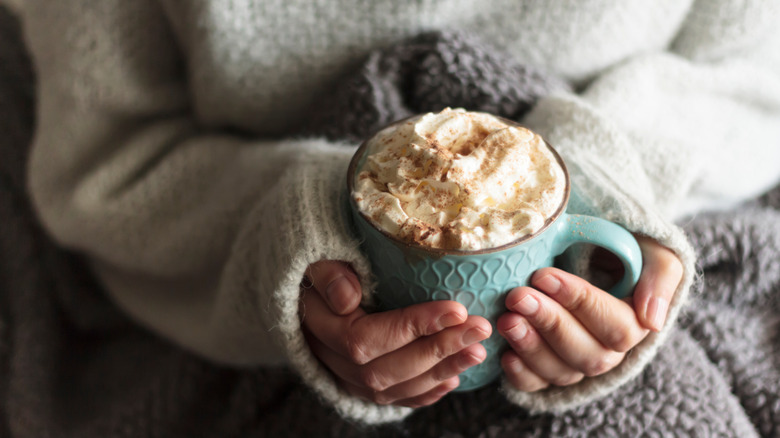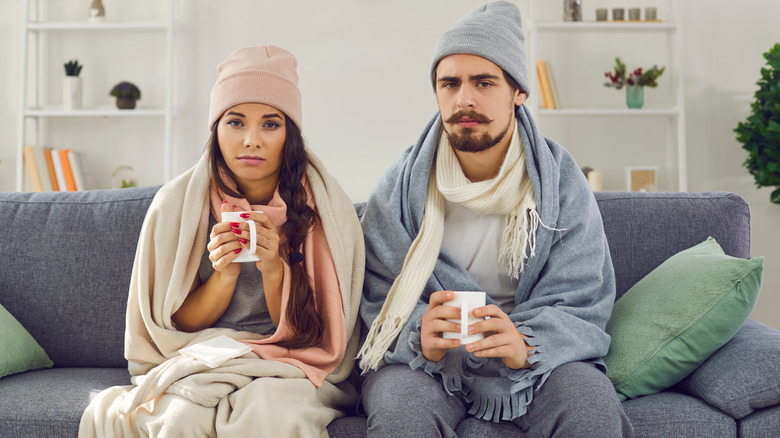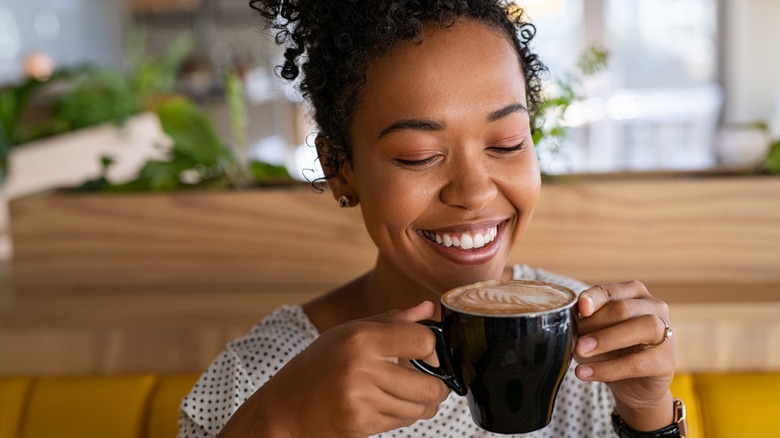Do Hot Drinks Truly Keep You Warm On Cold Winter Days?
There are plenty of things to love about winter; snowy landscapes, sledding and skiing, hoodies and fuzzy throw blankets, and, of course, all the luscious warm beverages that come out around this time of year. Coffee, of course, is a must, whether it's a standard brew or the gingerbread and peppermint holiday concoctions Starbucks serves in its iconic red cups. Hot tea is another classic, while soup of any kind makes a comforting end to a chilly day, and mulled hot cider or wine is just begging to be sipped by an open fire.
Besides, who can resist a cozy cup of cocoa? (Not us). When we reach for that steaming mug or bowl, it's not only the taste we're anticipating but also the warmth. It's soothing just to hold it in your hands — and, in fact, a study published in the journal Science (via the National Library of Medicine) found that holding something warm makes people warmer towards others. We turn to hot liquids in the winter in hopes of fighting off the chill from the inside out, but do they really warm us up as much as we think?
Hot drinks may actually have the opposite effect
Experts claim that you can go ahead and savor a mug of cocoa after snow tubing, or ladle out the chicken soup on a sleety night — but it doesn't take away the cold as much as you might think. As clinical dietitian Sharon Smalling told Fox News, drinking warm liquids raises our body temperature just a little above normal for about 20 minutes before our internal thermostat resets. In the meantime, our bodies have their own way of staying warm. When we're cold, our circulatory system sends more blood toward the extremities (hands and feet) to keep them from freezing.
Shivering also naturally sends warm energy to the internal organs to keep them functioning. Surprisingly enough, having a hot drink might be more beneficial on a sweltering August day than a bitter January one. As neuroscientist Peter McNaughton explained in an interview with NPR, we have a special heat receptor in our tongues that recognizes when we've put something warm in our mouth. This receptor then signals the brain that the body is hot, which in turn activates the sweat glands to perspire and make us cooler. Still, most of us would prefer to bring a steaming flask of coffee to the ski slope than to the beach.
The benefits of hot drinks are mostly psychological
If hot tea and cocoa don't really warm us up all over, then why do we assume they do? Plainly speaking, a lot of it is in our minds. Because we associate hot drinks with internal and external warmth, the psychological effect is so strong that we think we feel warm by ingesting heated fluids, even if our body temperature isn't rising. The same mental process applies when using a hot beverage to combat the sniffles.
Per The Guardian, researchers at the Common Cold Centre at Cardiff University asked volunteers with cold symptoms to drink a fruit juice that had either been warmed up or served at room temperature. People who drank the warm juice reported feeling more relief from coughing, sneezing, congestion, and other ailments than those who imbibed the colder juice, even though their nasal congestion didn't actually improve.
We also tend to drink winter warmers like coffee and hot cider slowly (a burnt tongue can ruin your day!). Thus, the time you spend carefully sipping allows your body to adjust to the indoor temperature, especially if you're in a warm cardigan or robe. Having a hot drink can even make you feel emotionally warmer too. That same study from Science found that people who held a cup of hot coffee were more likely to describe others in positive terms afterward. So, make that pumpkin spice latte a venti, and you could spread the warmth in more ways than one.


